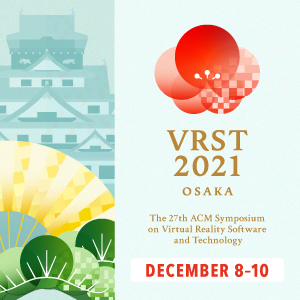Parallel Ping-Pong: Demonstrating Parallel Interaction through Multiple Bodies by a Single User
-
 Full Access
Full Access
-
 Onsite Student Access
Onsite Student Access
-
 Onsite Experience
Onsite Experience
-
 Virtual Full Access
Virtual Full Access
-
 Virtual Basic Access
Virtual Basic Access
All 19 presentations are accessible on-demand in the virtual platform from 6 December 2021 to 11 March 2022.
Out of which, 13 Emerging Technologies will have physical exhibits onsite in Hall E, Tokyo International Forum from 15 - 17 December 2021.
Live demonstrations and Q&As for the respective presentations will be taking place at the specified Date/Time below.
Description: Parallel Ping-Pong is a Parallel Interaction with multiple bodies (here 2 robots arms) controlled by a single user. To reduce the user workload when controlling multiple bodies, we added (1) an automatic view transition between the bodies' viewpoints, and (2) an autonomous body motion integrating the user motion.
Presenter(s):
Kazuma Takada, Sony Computer Science Laboratories, Inc.; Meiji University, Japan
Midori Kawaguchi, Keio University Graduate School of Media Design, Japan
Yukiya Nakanishi, Sony Computer Science Laboratories, Inc.; Keio University, Japan
Akira Uehara, Sony Computer Science Laboratories, Inc., Japan
Mark Armstrong, Sony Computer Science Laboratories, Inc.; Keio University Graduate School of Media Design, Japan
Adrien Verhulst, Sony Computer Science Laboratories, Inc., Japan
Kouta Minamizawa, Keio University Graduate School of Media Design, Japan
Shunichi Kasahara, Sony Computer Science Laboratories, Inc., Japan
Midori Kawaguchi, Ph.D., researcher at the Keio University Graduate School of Media Design. Received her Ph.D. in Information and Communications Engineering from the University of Tokyo Institute of Technology in 2020. Her research focuses on human augmentation.
Yukiya Nakanishi is a graduate student at the Keio University Faculty of science and technology. His research focuses on human interaction, sensing system. He recently researches about human-robot interaction, integration and parallel embodiment. He is also a research assistant at Sony Computer Science Laboratories Inc.
Akira Uehara, Ph.D., Adjunct researcher at Sony Computer Science Laboratories, inc. Interaction designer at Sony Group Corporation. Received his Ph.D. in Engineering from the University of Tsukuba in 2020. His research focuses on interaction with autonomous system such as AI and robots utilized Cybernics that enhance, strengthen, and support physical and cognitive functions of human beings, based on the fusion of human, machine, and information systems. His research has been awarded in the academic fields of biomedical engineering and systems integration.
Mark Armstrong is a PhD Student at the Keio University Graduate School of Media Design. A creative technologist, he has developed spatial augmentation systems that promote physical and virtual environmental coexistence through holographic projection interfaces as a member of the Embodied Media Project. His research focuses on the use of emerging technologies to achieve human multi-presence, avatarization, and parallel embodiment. Mark recently served as a research assistant at Sony Computer Science Laboratories Inc., and in his spare time, he also teaches coding, robotics, digital arts, and music production to international students aged 4-17.
Adrien Verhulst received a PhD in Computer Science at the École Centrale de Nantes in 2018. He then worked as a project researcher at the University of Tokyo. He is now working at Sony Computer Science Laboratories. His research interest focuses on Embodiment in Virtual Reality.
Kouta MINAMIZAWA, Ph.D, Professor at Keio University Graduate School of Media Design Received his PhD in Information Science and Technology from the University of Tokyo in 2010, he directs the KMD Embodied Media Project, where conduct research on technology, design and social deployment of haptics and embodied interaction to transfer, enhance and create the human bodily experiences, and organizes research projects on Haptic Design, Superhuman Sports, and Sports Co-creation. He also serves as a Project Manager of JST Moonshot R&D Program, Executive Director of the Superhuman Sports Society, and Technical Advisor at Telexistence Inc.
Shunichi Kasahara Ph.D. Researcher, Group leader at Sony Computer Science Laboratories, Inc. Received his Ph.D. in Interdisciplinary Information Studies from the University of Tokyo in 2017. He is leading “Superception” research: computational extension of human perception and investigation of the self in human-computer integration. The result of his research has been presented at the major international conferences in the fields of computer graphics, human-computer interaction, and media technology festivals. He also conducts interactive exhibitions and social implementation.





